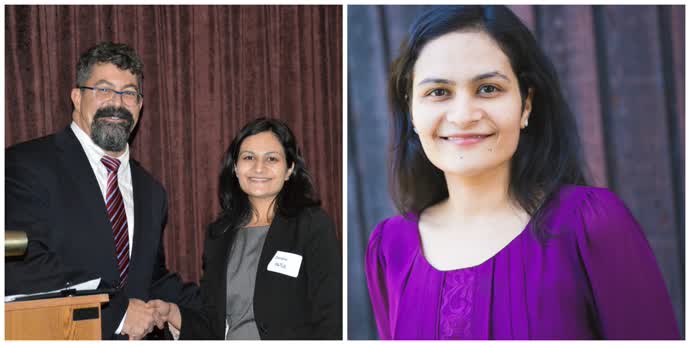
Left: Ms. Kapur with Dean Paton at the 2015 Prizes & Awards ceremony, where Kapur received the N.D. McDermid Graduate Scholarship in Law
Right: Ms. Kapur (Photo courtesy: Gurveer Chohan)
Since arriving in Edmonton in 2015, Shivani Kapur has landed an impressive internship, gotten married, and undertaken research on a topic that has the potential to affect nearly one-half of all Canadians.
"I have never been this busy, but I am enjoying it," she said with a laugh.
Although having a calendar with little room for downtime may be relatively new to the law student, academia is not. In 2012, Ms. Kapur earned an LLB from the University Institute of Legal Studies in India, the country in which she was born and raised. A year and a half ago, she moved to Alberta to study at UAlberta Law for her LLM.
Ms. Kapur's research centres on pregnancy discrimination in the workplace, a topic that arose from an experience she had while working as a judicial intern at the Punjab and Haryana High Court in India.
Ms. Kapur was saddened - and surprised - to see how colleagues reacted when a judicial stenographer at the court announced she was pregnant. Ms. Kapur said that both male and female co-workers immediately tried to take her position. It was this experience - combined with her mother's own challenges in the workplace - that inspired Ms. Kapur to research the issue further.
"Almost every Canadian woman is in the workplace," she said, when asked why the topic is important to address.
According to Ms. Kapur, pregnancy discrimination in part results in women not being recognized for their hard-earned credentials.
"Women have to do exams and get degrees, the same as men," she said, adding that the idea of women having to choose between being a mother or having a career is both outdated and uncalled for.
Being viewed as unequal to men is an issue Ms. Kapur can relate to.
As a woman who moved to another country to pursue higher education, she is not part of the majority in India.
"I credit my parents, who instilled autonomy in me. They taught me we are no different than boys," she said of choosing to go against the norm in her home country.
During her research, supervised by Associate Professor Eric Adams, Ms. Kapur said she found that although overt pregnancy discrimination is rare in Canada, there are still many negative attitudes and stereotypes.
"Canada has made significant progress in human rights legislation, but there is still a long way to go to match the efforts of other nations," she said.
She cites the government in Sweden, who gives paid parental leave for 480 days, and employers in Australia, who help women transition back to work smoothly, as two examples Canada should follow.
Ms. Kapur has presented her research at the National Health Law Conference at the University of Ottawa and at Osgoode Hall Law School's Graduate Conference.
She has interned at Virk Law in Edmonton, and also served as Civil Claims Duty Counsel for Student Legal Services in Edmonton. Most recently, Ms. Kapur is working as a graduate ombuds intern in the UAlberta Office of the Student Ombuds, a position she found through the university's Graduate Student Internship Program.
"I work primarily with graduate students about resolving disputes with other students or with supervisors," she said, adding that the role has given her better communication, negotiating and listening skills, as well as improved her ability to counsel clients.
Ms. Kapur is also a human rights law intern and research assistant with the Department of Earth and Atmospheric Sciences. She is currently involved in a project that asks if municipal bylaws are in accordance with human rights laws. The study, funded by the Social Sciences and Humanities Research Council, as well as the Alberta Human Rights Commission for locations in Alberta, will look at 13 cities and rural counties across Canada.
Ms. Kapur is the recipient of a number of scholarships, including the Faculty of Law Scholarship for Graduate Students, the Honourable N.D. McDermid Graduate Scholarship in Law, and the Julia and William Warnke Excellence Fund in Law. In 2015, Kapur received a fellowship in Health Law, Ethics and Policy from the Canadian Institute of Health Research.
When she isn't studying, working, or winning awards, you're likely to find Ms. Kapur on FaceTime with her parents and sister, who remain in India. Although she hasn't been back since she left in 2015, Ms. Kapur plans to visit once her LLM is complete, scheduled for April 2017. She also said she's pondering the idea of pursuing a PhD, though she's looking forward to gaining work experience and taking a break from academics.
Ideally, after her studies and internship are complete, Ms. Kapur is hoping to find employment at a university in a role similar to her job currently as an ombuds.
"I want to give people hope and put a smile on their face," she said.
Considering her impressive list of accomplishments, and the many people she's already connected with, there is no doubt Ms. Kapur is well on her way.